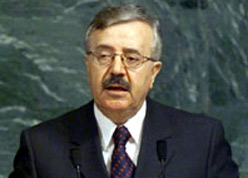Untitled Document
MSNBC is reporting the story
of the Iraqi Foreign Minister who allegedly gave information to the CIA about
Iraq's WMD programs (or lack thereof) prior to the U.S. invasion. There are
some curious aspects to the way this story is being reported. First, the facts
that are on public record:
In September 2002, at a meeting of the U.N.’s General Assembly, Sabri
came to New York to represent Saddam...He announced that there were no weapons
of mass destruction and that the U.S. planned war in Iraq because it wanted
the country’s oil.
OK, so far so good. He got that 100% correct (although there were many reasons
for the war, but oil was certainly one of them). But then, we're told, he met
with the CIA through a "cutout" (and was paid $100,000 for his troubles)
and, says MSNBC, "The sources say Sabri’s answers were much more accurate
than his proclamations to the United Nations." Really? Considering that what
he said at the U.N. was true, it would be hard to be "more accurate,"
wouldn't it? What were those answers?
Sabri indicated [to the CIA] Saddam had no significant, active biological
weapons program. OK, that makes that one "just as" accurate
as his proclamations to the U.N.
Sabri said Saddam desperately wanted a bomb, but would need much more
time than [a year]. The "accuracy" of the claim that Saddam
"desperately wanted" a bomb is entirely open to question; we'll have
to ask him. As far as the time it would take to make a bomb if they obtained
enriched uranium, again, all we do know is that there was nothing actually happening
- no centrifuges, no efforts to actually obtain enriched uranium. Which pretty
much adds up to nothing.
On the issue of chemical weapons, the CIA said Saddam had stockpiled
as much as "500 metric tons of chemical warfare agents" and had "renewed"
production of deadly agents. Sabri said Iraq had stockpiled weapons [Ed. note:
how many?] and had "poison gas" left over from the first Gulf War
[Ed. note: which Scott Ritter has explained would have been utterly useless
in 2003]. Both Sabri and the agency were wrong. So...that doesn't sound
"more accurate" than what he said at the U.N. either.
"More accurate"? Huh?
Here's what is true about this story. George Tenet knew about
this interview with this secret source, which took place in Sept., 2002. In
February,
2003, five months later, George Tenet sat behind Colin Powell while Colin
Powell lied to the United Nations and to the world, and George Tenet
knew he was lying.
Here's what else is true. "After the war, Sabri [the Iraqi Foreign Minister]
was not arrested or put on the notorious 'deck of cards.' He lives in the Middle
East." Meanwhile, Gen. Amer al-Saadi, who also
told the truth to the world but didn't take money from the CIA to tell them
a different story in private, remains in jail, just a little less than three
years after voluntarily surrendering to U.S. forces under the assumption that
he had done nothing wrong and would soon be released.
_______________________________
Saddam's FM was on CIA payroll
AFP
Iraq's foreign minister under Saddam Hussein spied for the CIA before the
US-led invasion in 2003 in return for a 100,000 dollar payment, a US television
station reported.
 |
|
Iraq's top diplomat Naji Sabri traded information on Hussein's alleged weapons programme.
|
In September 2002, Iraq's top diplomat Naji Sabri traded information on Hussein's
alleged weapons program for cash in a French-sponsored New York City hotel room
meeting, NBC reported, citing intelligence sources.
US intelligence agents believe Sabri was fully aware he was selling information
to the CIA, it said.
During the cloak-and-dagger meeting, Sabri told the CIA's middleman that Saddam
possessed chemical weapons and wanted a nuclear bomb but needed much more time
to build one than the CIA estimate of several months to a year.
He also denied Saddam had any biological weapons.
Sabri's tips were thought to be more accurate than the CIA's own guesses on
Saddam's arsenal, NBC said.
However, the foreign minister broke off his contacts weeks later after he repeatedly
resisted CIA pressures to defect to the United States and publicly renounce
Saddam, the sources told NBC.
After the US invasion of March 2003, Sabri was not arrested or included in
the notorious "deck of cards" of the US military's most wanted Iraqi
suspects.
Sabri, who now teaches journalism in Qatar, has turned down repeated requests
for comments, NBC said.
Saddam's nuclear, chemical and biological weapons programs were revealed to
be non-existent after the war.
A new US military study, based on interviews with jailed members of Saddam's
regime, revealed that Saddam had tricked even his inner circle to believe he
had weapons of mass destruction until shortly before the US-led invasion.
Sabri, fluent in English, was one of Iraq's public faces in the West.
The former English literature professor at Baghdad university was recalled
from Iraq's London embassy in 1980 after two of his brothers were arrested for
plotting against the regime. One of them later died in prison.
For the next decade, Sabri edited an English language newspaper and translated
English books into Arabic, including a biography of George Bernard Shaw.
He returned to prominence ahead of the 1991 Gulf War as Iraq's deputy information
minister. He was later appointed Iraq's ambassador to Austria in 1998 before
being named foreign minister in 2001.

